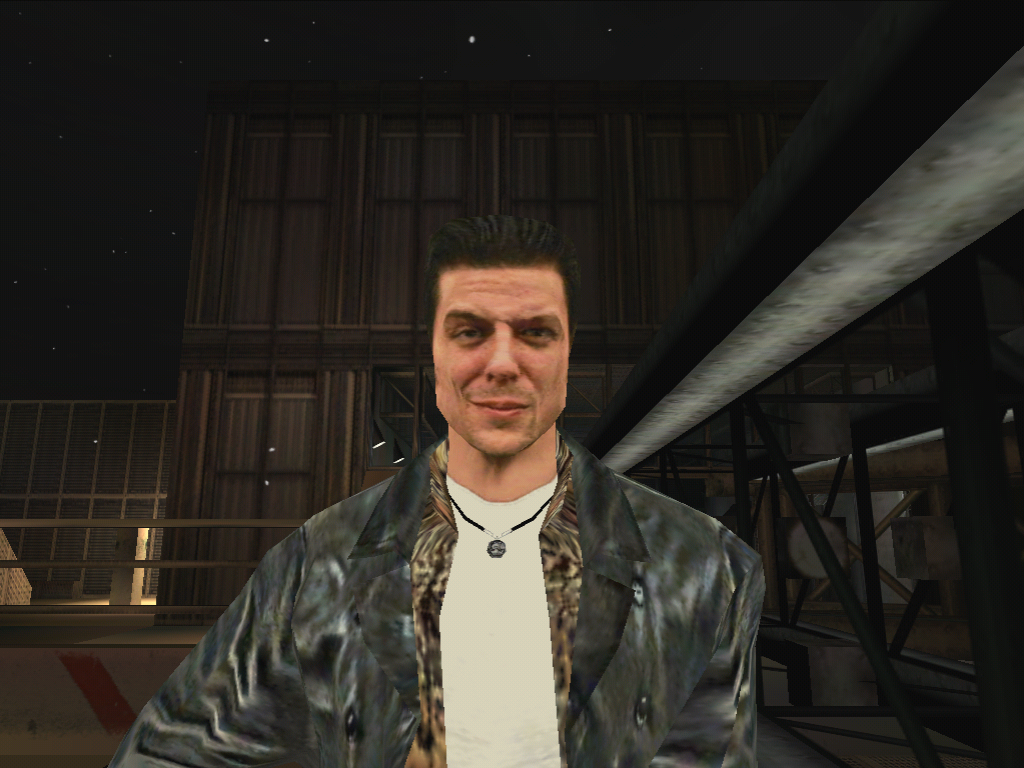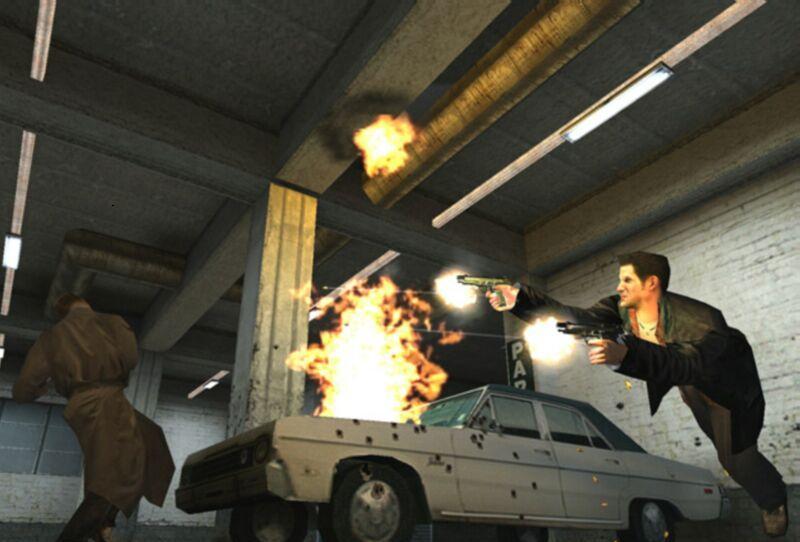Yes, the Wii retrospective is cancelled. I don’t care
anymore and you most certainly never
did.
Instead, let’s talk about Max Payne, cause I've been pretty into that lately.
I hated it.
Not that I shared those feelings for Max Payne. In fact, I
had no feelings towards the game, negative or otherwise, because I was six years old and
far too young to be playing “MACHUR” games. Conveniently, I forgot it existed
until I played Alan Wake two years ago. Also, I reviewed it, but it was a lame
review that no one should ever read because I was still new to the whole
“explaining my opinion in a coherent manner” thing. That said, the score was a
whopping 10/10, and I still stand by that. Alan Wake was a phenomenal
experience on every possible level. Every facet of it just…fell into place. The
interesting and unique gameplay, the haunting atmosphere, the horror movie
presentation, all wrapped around a gripping postmodern narrative that was
constantly escalating and thickening with several likable and intriguing
characters to drive it forward…it was a game that showed me
just how powerful this medium had become. It’s one of the most well-crafted
gaming experiences I’ve ever had, and I’d quickly call it one of my all-time
favorites. It inspired me to review
it. Not many games so inspire me to
review them, but this one did. Yeah.
In doing research for that review, it stands to reason that
I would be informed of its being developed by Remedy Entertainment, responsible
for Max Payne and its first sequel. Further research would suggest that the Max
Payne series is also, as a matter of fact, very good. My curiosity piqued, I resolved that I would
have to try the games at some point to see if they contain the same magic that made Alan Wake so special, or, if not that, to see if they're great games in their own way. That “some point” just so happens to
be now. And hey, since I haven’t done that sort of thing in about three months,
I think I might just review all of the games, too, one at a time. I am also
going into this having had no experience with any third-person shooter released
before 2006, so bear that in mind if I make special note of something that was
actually commonplace back in 2001-2003 when I review the first two games.
So, let us begin, and what better place to start but with
the very beginning of the series. Max Payne was released for PS2, Xbox and PC in 2001. Let’s just say it shows.
Anyway, our titular character, Max Payne, is a former NYPD
officer who became an agent for the DEA after his wife and child were brutally
murdered by criminals on a new drug called “Valkyr”. Now going undercover, he
must stop the trafficking of the drug by infiltrating the Punchinello Mafia
family. With that brief summary behind us, when I started the game, I was
already able to see that, yes, these are definitely
the same people who would later craft Alan Wake so lovingly. Aside from the
game’s title being the main character’s full name, there’s a ludicrous amount
of first-person narration from our main character, during both story and gameplay sequences.
Music is also used sparingly in order to maintain atmosphere - more so here than in Wake - and there are
also some…bigger things. Much like Alan Wake, Max Payne presents itself with
the tropes and storytelling methods common to a popular genre of fiction. Alan
Wake was very much a horror movie, while Max Payne is very much a noir graphic
novel.
All major scenes in Max Payne play out panel-by-panel,
narrated by Payne himself. The comic book motif isn't completely unique to Max
Payne (or, at least, not anymore), but the game executes it pretty well. It takes a pretty interesting
approach to art direction, using actual photographs edited to give them a sort
of watercolor look. While some panels do end up looking a bit…ahem…off…
…this approach does work in the game’s favor, giving the
cutscenes a unique visual style while at the same time complimenting the gritty
noir atmosphere. As for the story itself, it struck me as very dark, but at the
same time...strangely cheesy. I’m going to be up-front about this: noir isn’t a
genre I’m terribly experienced with, so I’m probably not fit to judge how well
it executes that – but judging by the acclaim at the time of release, it
probably does a pretty good job of it. That said, I noticed some things that
would ordinarily make a story this gritty hard to take seriously. 2001 was
basically the “awkward teen phase” of American voice acting; we were just
starting to make the transition from this to the much more professional voice work we see in games today. This does
reflect in Max Payne: the voice acting isn’t exactly terrible, but can be a bit over the top for such a
dark game. The title character himself, in contrast, delivers a drained, slightly deadpan performance that, while very fitting of the character, sounds a bit,
for lack of a better word, stereotypical. The character’s dialogue, filled with
ridiculous metaphors that don’t even make sense in context 100% of the time, was also
something that caught my attention. In fact, the dialogue in general is a bit...well...
And yet, it’s hard to say that this really works against the
game’s story when it’s pulled off so...sincerely that it actually becomes,
in a strange way, endearing, as if the game isn't taking itself so seriously to begin with. Its name is Max Payne, after all - would it make sense for such a cheesy name to be attached to a completely un-cheesy game? If anything, I found that these odd quirks actually caused me to enjoy the story more and even to get more attached to Max Payne as a character as I played on
through the plot. Payne’s story is a fairly complex one with a few twists and a lot of build-up. It’s really quite intriguing while it lasts, but the
payoff is...surprisingly unfulfilling. Max defeats the main villain and the game just
sort of…ends. I guess there wasn’t much more of a story to tell, but it feels like
it ended on a bit of a “meh” note, like there should have been more to the ending. The story overall is
good stuff, but that struck me as bothersome. Funnily enough, the GameFAQs
guide I was using described the game as “life-changing” at the end, which
really did kind of put things into perspective. Max Payne is still a fun story
to watch play out, but back then, it must have been something truly special.
Not that I would ever really describe a video game as “life-changing”, but it does
show how far video game storytelling has come since the strange and fascinating
age of 2001.
And, of course, gameplay mechanics have come a long way
since that strange and fascinating age, as well, and that stuff tends to fare much worse than the story when held up
to modern standards. What can be said about Max Payne in this regard? Well, it’s
a third-person-shooter whose main new (though not so much anymore) gameplay mechanic is a Bullet Time
move, allowing you to perform quick and stylish slow-motion shoot-dodges in any
direction by holding the left trigger button (on an Xbox controller) and moving
the control stick. Simply tapping the left trigger button will allow you to
slow down time, giving you more of an opportunity to react to enemies. Other
than that, it plays how you would expect. You go from point A to point B,
killing people with guns. Hooray.
I’ll be honest: going into this game, I expected the
gameplay to be pretty generic. Fortunately, I was pleasantly surprised with
what I saw. The lack of precise aiming did prove quite the
concern at first, though. Most third-person-shooters nowadays offer some form
of over-the-shoulder aiming ability that gives you more accuracy with your
shot. Max Payne was released in a different time and thus lacks such creature
comforts. When it comes to aiming, you have the right analog stick, a tiny
reticle in the center of the screen, and nothing else. For someone so
accustomed to games like Uncharted, this was like plunging out into the wilderness without a
compass. Sure, Alan Wake handled its controls in a somewhat similar manner, but it was still more...accessible for me with the way it handled it, I suppose. However, once I really got settled in, I didn’t completely miss it. In
general, the game was made with its control scheme in mind, just like…pretty much
any good game, but Payne’s approach to gunplay kind of caught me off-guard (in a good way) after spending so much time with the likes of Gears of War.
Precision and competence with the controls are not your most
important assets in Max Payne. Instead, it feels more focused on detecting and constantly
reacting to enemies around you, or even taking some time to assess your situation before making your move. This is something that almost goes against the way a lot of big shooters are designed today and, well…it…really works. The game
has a different sort of health system – up to a certain amount, all damage
incurred upon you is stuck to your person until you can heal with some
painkillers, which the game isn’t exactly generous with until the near-end of
the game, when there’s danger around basically every corner. Thus, the game is
every bit as much about not getting
hit as it is about delivering the payne
(I’m so sorry, please forgive me). But
basically, you can never rush in guns blazing and expect things to go in your favor. You have to constantly be on your toes, prepared at any moment to jump
into action. During gunfights, you must always be aware of your surroundings
when hiding and you must be in perpetual motion when dealing damage yourself.
There is no way to “take cover” in this game and, again, over-the-shoulder
aiming is also a no-no, so you can’t stop running for even a moment when
engaging an enemy. This was something I found to actually make the combat a lot
more exciting. This is also where the abilities to shoot-dodge and slow down
time become not only fun to use but also downright invaluable, not only in
allowing you to react more effectively to your enemies, but also in escaping a
swift and inevitable death.
Max Payne at times even requires you to think a bit about which weapon you'll want to use for a given situation. It has several different types – pistols, shotguns,
Ingrams, typical throwables, rocket launchers, sniper rifles, and various other guns you can use here and there – but the
great thing is that you keep all of the weapons you find until you finish one of the story’s
three parts. While you're given freedom of choice, some are useful for different situations than others, which I quite liked. Enemy
AI is scripted, meaning that you are actually able to learn how to predict
enemies’ actions, making it easier to plan your moves when repeating a segment
of the game. Most likely, this is something that will be happening a lot, since, at least on the difficulty level I was playing on, the game really isn’t easy. There are
some occasional “How was I supposed
to react to that?” moments, but in general, it’s not cheap. The important
thing is just to always tread carefully and quick save often. Yes, you can save
literally wherever you want, whenever you want, and you’ll start from
that point when you die. On one hand, it’s pretty handy if you use it well. On
the other, if you don’t, you can really put yourself in a bad situation. This
happened to me a couple of times and it wasn’t pretty.
 |
| Here, have another generic screenshot pulled directly off Google Images. Look at those graphics. Mmm. |
Now, with all that said, as I was playing, I couldn't help but feel like the
game really could use more precision than it gives. The aiming reticle is
pretty oversensitive, which can and often will make shooting at any faraway
target a tedious experience. The lack of aiming precision was also,
unfortunately, quite noticeable when shoot-dodging in Bullet Time, which
lessened the usefulness of the mechanic a bit even if it didn’t make it much
less fun to use. I was really hoping that getting the sniper rifle late in the
game would erase this problem, but all it did was make it that much more
noticeable, to the point of rendering the weapon nigh-on useless for its
intended purpose. As for other problems with the game, the other one that
really stands out is that there are a handful of moments that ask you to seek
out a button or switch of some sort in order to proceed, which the game
sometimes fails to point out clearly enough, resulting in a bit of aimless
wandering.
And then there are the nightmare sequences.
Isn’t it great when a generally fun game suddenly and
unexpectedly pulls some random garbage that completely breaks the flow of the
experience and forces you to endure hours of frustration? Twice? Behold, the first of Max Payne’s nightmare sequences. And there is another one, too.
They’re not scary, they’re not interesting, they’re not
innovative, and most of all, they’re not
fun. I did not play this game to run around a convoluted maze for hours
while a disembodied voice screams at me. If I wanted to endure awkward, wonky platforming
on criminally narrow footing with catawampus jumping physics, I’d play Sonic
and the Secret Rings. If I wanted to hear babies screaming, I’d enter a daycare
center. No one wants to hear screaming babies. Why would you force me to hear
screaming babies. Why would you torture me with this out of place platforming
segment that feels like it was designed by a demented nine-year-old. Why would
you force me to play through a nightmare
sequence in the first place. Why would you play them up as if they’re
somehow frightening when all they do is scream “trying too hard”. Why would you…just…why.
 |
| WHY |
So, all that aside, how well does Max Payne hold up? In
short, surprisingly well. There are a couple of moderate annoyances and…a
couple of major ones, but for
everything that annoyed me about Max Payne, there was something that seriously
impressed me about it. It really is a fun experience, and, honestly, I think
there are some things shooters could learn from it even today. It’s by no means perfect, but there are many
aspects of its design that still really work. As for Max Payne 2? Well, we’ll
see what that has in store for us next time. In the meantime, farewell.








No comments:
Post a Comment